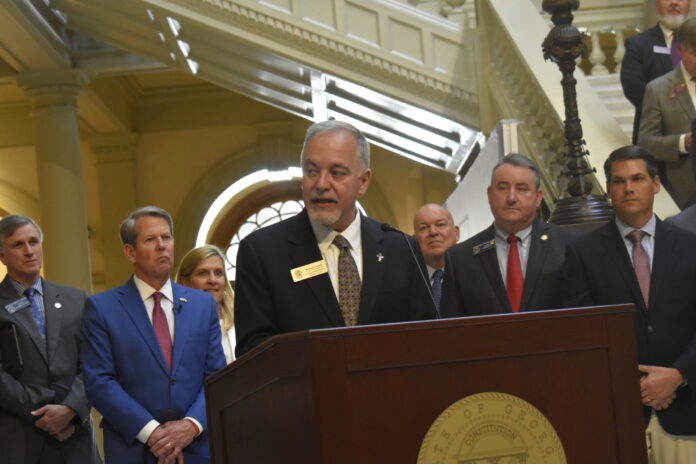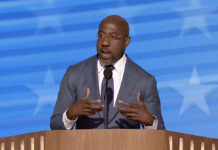
(Georgia Recorder) — Advanced Placement African American studies will be offered in Georgia high schools with state funding, Superintendent Richard Woods said Tuesday, but some members of both political parties are still wondering why there was ever any question.
Woods, a Republican, said his reversal came after receiving a letter from Georgia Attorney General Chris Carr, a Republican, clarifying that House Bill 1084, the state’s 2022 law banning so-called divisive concepts in the classroom, exempts AP, international baccalaureate and dual enrollment classes.
“Thus, any such course developed by its controlling entity will be automatically adopted within the state-approved course catalog. It will not have to receive a recommendation from either the State School Superintendent of Georgia or the Georgia State Board of Education. It will also not require a vote to approve or deny adoption into the state-approved course catalog,” Woods wrote in a statement.
“As I have said, I will follow the law. In compliance with this opinion, the AP African American Studies course will be added to the state-funded course catalog effective immediately,” he added.
Woods said all AP courses will now come with a disclaimer in the state course catalog stating that they were not vetted by the state and that districts need to obey the law.
The school year has already begun for many Georgia students, and some districts, including Atlanta Public Schools and Cobb County Schools, said they are offering the course like any other AP class.
Georgia’s largest school district, Gwinnett County, previously said it would not offer the class, but county superintendent Calvin Watts said Wednesday that schools will work with students who signed up for the course last spring to allow them to change their schedules to add the class.
“While this is a victory in many ways, the State Superintendent’s actions caused undue burden on our schools and pain to many in our community, including our students,” he said. “However, I am grateful for the collective advocacy of our students, families, staff, and community to do what is right for our students. I am sorry that we went through this, but I am happy that in the end, our students can take this course and receive the full AP experience and rewards of completing the course successfully.”
Woods’ move is a reversal from last week when he said he chose not to recommend state approval for the college-level class because of the divisive concepts law, although he said schools could still offer the class through a workaround. That didn’t satisfy many critics, who said treating a class on Black history and culture as separate and controversial appeared racist.
Republican Gov. Brian Kemp also evinced doubt about Woods’ decision, sending him a letter questioning aspects of the choice.
Last week, Woods said he was seeking to determine whether the law exempted AP and other advanced classes. That’s where Rep. Will Wade came in. The Dawsonville Republican who sits on the House Education Committee was the chief sponsor of the divisive concepts bill and said the bill absolutely exempts those classes.
“Once I understood that he was trying to find clarity, I felt obligated as the author of the bill to get clarification with the AG’s office, which he provided to me, and I shared it with the staff at the DOE to say, ‘Hey guys, I’m not sure why you are having confusion and what’s going on, but I want you to know that I’ve asked this question, and I’m happy to share it with you.’ And that occurred earlier this week,” Wade said.
The divisive concepts bill states that “Nothing in this Code section shall be construed or applied to …. Prohibit the full and rigorous implementation of curricula, or elements of a curriculum, that are required as part of advanced placement, international baccalaureate, or dual enrollment coursework; provided, however, that such implementation is done in a professionally and academically appropriate manner and without espousing personal political beliefs.”
Wade said he and the House Education Committee decided to add that carve out to protect students’ opportunity to take challenging classes meant for college students and earn extra credit.
“I think that he understands that he made a mistake,” he said, referring to Woods. “I understand he apologized last week for how we got where we got, but I can’t tell you why. I don’t know his legal opinion or who is advising him in his office, and I’m a big believer in teamwork and learning from mistakes. I’m a son of two educators, and that’s part of learning, and so I hope that the superintendent uses this as a great learning experience to improve communication and gain better understanding in the future as it relates to laws that affect his department and his responsibilities.”
Education Department spokeswoman Meghan Frick said Woods had been in contact with Carr before receiving the letter from Wade.
“This, along with clarification he sought and received from the AG regarding the course adoption process, is the first formal legal opinion we’ve received on this issue,” she said.
The Georgia Attorney General’s office spokesperson Kara Murray confirmed the office provided legal advice but said they could not provide comment on it because of attorney-client privilege.
Powder Springs Democrat David Wilkerson, another House Education Committee member, said he’s relieved at the resolution, but he worries the divisive concepts bill creates more messes that lawmakers will need to decide how to tidy up.
“Even though the advanced placement was there you still get the risk of a teacher giving their political views, and that’s never been clarified on what that exactly means, your personal political views,” he said. “Is slavery wrong? Is it not wrong? I think we all agree at this point that it was wrong, but that still could be espoused as a political view. So I think as long as 1084 is around, I think you’re going to have that concern. Now instead of having it at the DOE level, you’re going to have it at the district level.”
The course has been a flashpoint in the culture wars nationwide, including in Arkansas, where a lawsuit involving the course is underway, and in Florida, where Gov. Ron DeSantis said he would ban the course because he said it represented an attempt to indoctrinate children.
The battle lines have been different in Georgia, with Republicans who speak on the record opposing Woods’ original decision not to support the class.
Emory University political science professor Andra Gillespie said Woods may have realized he was fighting a losing battle without any allies, and Kemp may have calculated that appearing to fight against African American studies may have presented a bad look ahead of this year’s election.
“It could be something about not sending off unnecessary salvos in the culture wars,” she said. “This could be viewed as excessive, and it’s also something that could be framed as denying children the type of educational advantage that’s going to make them competitive for college, right? There are content discussions that I think Kemp and Woods and other Republicans are comfortable having, but this particular issue of denying a class for which Georgia students could get college credit which would save them money in the long term and help them achieve a college education is something that looks like that you’re actually denying people more things than you are providing more advantages and opportunities. And the optics of it look bad in a state where 30% of the population is Black.”







